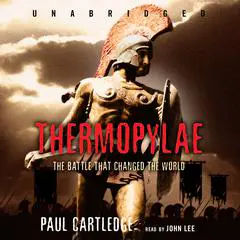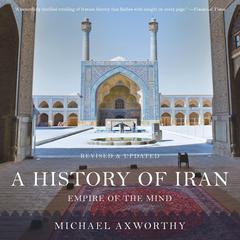 Play Audiobook Sample
Play Audiobook Sample
The Rise of Rome: The Making of the World's Greatest Empire Audiobook
 Play Audiobook Sample
Play Audiobook Sample
Quick Stats About this Audiobook
Total Audiobook Chapters:
Longest Chapter Length:
Shortest Chapter Length:
Average Chapter Length:
Audiobooks by this Author:
Publisher Description
Emerging as a market town from a cluster of hill villages in the eighth
and seventh centuries B.C., Rome grew to become the ancient world's
preeminent power. Everitt fashions the story of Rome's rise to glory
into an erudite book filled with lasting lessons for our time. He
chronicles the clash between patricians and plebeians that defined the
politics of the Republic. He shows how Rome's shrewd strategy of
offering citizenship to her defeated subjects was instrumental in
expanding the reach of her burgeoning empire. And he outlines the
corrosion of constitutional norms that accompanied Rome's imperial
expansion, as old habits of political compromise gave way, leading to
violence and civil war. In the end, unimaginable wealth and power
corrupted the traditional virtues of the Republic, and Rome was left
triumphant everywhere except within its own borders.
Everitt
paints indelible portraits of the great Romans—and non-Romans—who left
their mark on the world out of which the mighty empire grew:
Cincinnatus, Rome's George Washington, the very model of the patrician
warrior/aristocrat; the brilliant general Scipio Africanus, who turned
back a challenge from the Carthaginian legend Hannibal; and Alexander
the Great, the invincible Macedonian conqueror who became a role model
for generations of would-be Roman rulers. Here also are the intellectual
and philosophical leaders whose observations on the art of government
and "the good life" have inspired every Western power from antiquity to
the present: Cato the Elder, the famously incorruptible statesman who
spoke out against the decadence of his times, and Cicero, the consummate
orator whose championing of republican institutions put him on a
collision course with Julius Caesar and whose writings on justice and
liberty continue to inform our political discourse today.
Rome's decline and fall have long fascinated historians, but the story
of how the empire was won is every bit as compelling. With The Rise of Rome,
one of our most revered chroniclers of the ancient world tells that
tale in a way that will galvanize, inform, and enlighten modern listeners.
Download and start listening now!
"Not a bad read. I think Everitt's coverage of many aspects are VERY skimpy and it's obvious he's not a historian, but I enjoyed the read and learned quite a bit."
— Tim (4 out of 5 stars)
Quotes
-
Everitt takes [listeners] on a remarkable journey into the creation of the great civilization's political institutions, cultural traditions, and social hierarchy. . . . [E]ngaging work that will captivate and inform from beginning to end.
— Booklist Starred Review -
“Fascinating history and a great read.”
— Chicago Sun-Times -
“Rome’s history abounds with remarkable figures…Everitt writes for the informed and the uninformed general reader alike, in a brisk, conversational style, with a modern attitude of skepticism and realism.”
— Dallas Morning News -
“An engrossing history of a relentlessly pugnacious city’s 500-year rise to empire.”
— Kirkus Reviews -
“[An] engaging work that will captivate and inform from beginning to end.”
— Booklist
The Rise of Rome Listener Reviews
-
" I give Anthony Everitt credit for taking on this subject, which has largely remained untouched in the field of classical studies: that of the rise of Rome. Gibbon himself said that it was among the two most puzzling aspects of this society-the other being its fall of course a rite of passage for any classical scholar. The rise, however is harder, much harder: legend and fact are so intimate in the early days of Rome that it is very difficult, if not impossible to separate the two successfully. Everitt chooses the logical middle ground and uses portions of legend: timelines, basic events and so on, which is safe enough all the while weaving in what is archaeologically known. He did the same thing in his biographies of Augustus, Cicero, and Hadrian and it worked very well. It works well here too for that matter. Everitt also wisely stops his narrative at the death of Sulla instead of rehashing the old First Triumvirate, Caesar/Pompey Civil War Rivalry, assassination of the victorious Caesar, and rise of Augustus. He briefly mentions them, so this isn't necessarily a text that one would have to know significant background to enjoy. What I didn't like: Everitt supports the idea of a moderate, compromising Republic that was tragically overthrown, but he also notes which I did appreciate that the Roman Republic was not suited for overseas expansion, indeed it was not suited for expansion at all. Everitt however seems to largely buy the argument that the Roman Constitution, despite its flaws was at heart an excellent system, tragically overthrown-the obligatory response for any Roman history it seems. However, the Roman Republican form was not at all 'stable' in a governmental sense. It was obstinate certainly in that it proved inflexible to change, but hardly perfect, and no amount of moderation, or compromise could have saved it. The Roman government was fundamentally a flawed system-basing a government around an aristocratic class produced a rule as disconnected from day to day life as any monarchy, or dictatorship. Those who governed the state virtually excised those lower class, whom they yet relied upon as Rome grew in size, yet leaving them powerless in the political sphere. Greed and self interest for political office, lucrative overseas provinces and conquest destroyed Roman Republicanism, not failure to moderate. Hence I cannot award Everitt's work more than three stars in that the history is great, but what it means, is flawed. "
— Elliott, 2/8/2014 -
" This book made me realize just how little I actually know about Rome, particularly their Republic years! "
— Steven, 1/11/2014 -
" A great general history on the beginning and the early years of the Roman Republic. Perfect for people newly studying this period. Well written and clearly presented. "
— Robert, 12/24/2013 -
" A good, readable overview of the early Roman republic. I've also read his "Augustus", and now I'll have to add Hadrian to the list. "
— Keith, 12/23/2013 -
" Good book, lots of information in an easy to understand format. Very enjoyable. "
— Jenifer, 12/12/2013 -
" You know...I dunno. The style was over-breezy at times. But it gave me the information I was looking for, an overview of Roman history pre-Caesar. "
— Anne, 12/10/2013 -
" Excellent history of Rome in BC "
— Larry, 10/18/2013 -
" A completely detailed narrative of the Rome's timeline from the (legendary) birth of the city to the fall of the Roman Republic and rise of the Roman Empire. "
— Aloysius, 10/15/2013 -
" An engaging story, the blends myth and story and is mostly careful to identify which is which. "
— Chris, 12/31/2012 -
" Very interesting book that traces the development of the Roman Republic until it's fall. "
— Adam, 10/4/2012
About Anthony Everitt
Anthony Everitt, visiting professor in the visual and performing arts at Nottingham Trent University, has written extensively on European culture and is the author of Cicero and Augustus. He has served as secretary general of the Arts Council of Great Britain. He lives near Colchester, England’s first recorded town, founded by the Romans.
About Clive Chafer
Clive Chafer is a professional actor, director, producer, and theater instructor. Originally from England and educated at Leeds and Exeter universities, he has performed and directed at many theaters in the San Francisco area, where he makes his home, and elsewhere in the US. In 1993 he founded TheatreFIRST, Oakland’s professional theater company, where he served as artistic director until 2008.




























